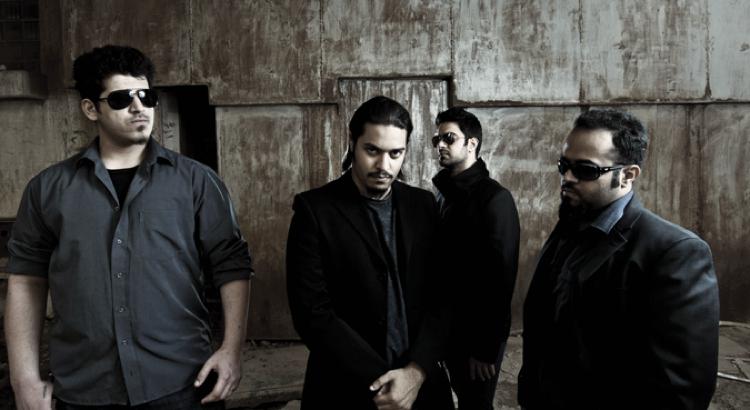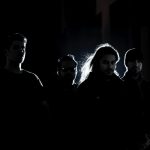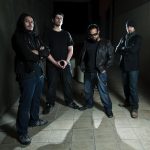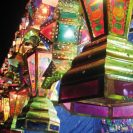After disbanding from previous local bands in 2010, Kuwaiti brothers Jassem and Yousef Al-rumaidheen decided it was time they took their music to a whole new level. The result is a 5-year- in-the-making move past experimentalism into the brave new world of what they call orchestrated melodic death metal. The fruits of that labor, their new record, Garden of Dystopia, represents a labor of love and toil. With Jassem at the helm of their compositions, and Yousef principally as the idea man, they combined with a list of local musical contributors (including good friends Aatrey on guitars and Mahmoud Tahan – Mortis, 23 on keyboards) and international musicians (Carlos Alvarez, Dan-Elias Brevig, Achokarlos, and Jon Phipps) for a sound that is distinctly their own. On the eve of their new release, we sit down to talk about their musical journey so far…
Tell us how you first got into music?
Yousef: Music has always been a big part of my life, ever since I was in kindergarten. I constantly identify with melodies and music in my mind. But I did not work on it as a serious outlet until my brother Jassem “Darkvain” introduced me to his industrial music project. Initially, I was merely the guy who helped name the songs. After a few years, Positive Poison, our earlier band, was constructed upon those industrial foundations and I helped out as a live keyboardist and live backing vocals. In the last years of Positive Poison I got to take on a bigger role as the lead vocalist. And as you can see now, Divine Disorder was born after years of musical experiences and personal projects.
Jassem: As Yousef has mentioned, I could remember that Positive Poison was my first serious port of expressing music. This was around early 2003. I had been involved in music and composing for a few years before that but Divine Disorder is my first serious step into the music industry.
How long have you been playing?
Y: I have personally been actively involved in the music world since 2004 as a pianist/keyboardist. Things have escalated for me in the years since around 2007 when I switched to singing.
J: I started writing music around the late 90s and it was more along the lines of midi sequencing, DJing, and writing basic dance/trance beats. This lent itself to developing a good understanding of the digital world of music for me. It happened before we got introduced to Metal or Rock music, which goes to show just how little appreciation the surrounding media had for those kind of genres – to a point that I wasn’t even aware back then that such genres existed. With time and our inclination toward Rock/Metal music, I devoted more attention to programming realistic drum patterns by studying drummers’ performances, seeing as drums play an especially important role in rock music with all the great energy it enriches the music with.
Usually that’s the spirit and inspiration such genres of music spread in us, as it is one of very few genres whose fan base is majority comprised of musicians as well.
What inspires your art and why?
Y: To be honest quite a few things and people inspire me to delve into my mind and uncover stories and treasures that every human has. First and foremost Hideaki Anno is the main person who has pushed me into reaching the furthest places into my mind. He has planted the curiosity within me that questions everything, which gave birth to the philosophy of the story that resides in this album and beyond. I have a whole list of inspirations to be honest! Because the thing is I see the beauty and the ugly in the world, and I just sit and admire that which drives me to write both philosophy and stories in my mind. I think my admiration of this beautiful life would mainly go to Mr. Charles Darwin.
J: Our minds, how it functions and how we receive and send information. Basically anything and everything our minds can create, calculate and cure/solve the puzzle that is our life.
How did you get into Metal music and specifically the kind your band plays?
J: Metal music – especially the harsh or extreme type that we play – has a very honest and straightforward attitude. This is the kind we need to express a pure idea to the widest range of people, and the kind that will grab people’s attention. It’s a figure of power and glory, and one of the strongest theatrical methods of expressing a very deep idea that wants to break out.
Y: Both my brother Jassem and I were big fans of the power metal genre. HammerFall was one of the very first metal bands we became fans of, for example. From listening to power metal we fell in love with the speed and glorious aura that it emitted, so we looked for other genres that gave us similar feelings. Then we found the extreme metal genre and we just went crazy! We always had a knack in putting things together that shouldn’t be! Jassem usually created new Lego pieces just to make robots or airplanes that fit the description in his mind. Also Rammstein, The Kovenant, Dimmu Borgir were all among the bands we were in love with.
Tell us about the name of the band – where did it come from?
Yousef: I LOVE this question! It is a constant reminder of our work’s grand roots. It is a psychological philosophical approach toward the life and cosmos. When us humans are in great calm and awe, we would feel the ultimate serenity which people often label it as “Divinity”. While when we are in our worst, the fine line between chaos and anger, we would feel an unamountable rage which people usually label it as “Disorder”. We humans are so keen on the idea that we are the center of the universe, the fine tip that holds the balance still. So most of our philosophy comes from the narcissistic human point of view of life and the cosmos.
Jassem: Yousef has summed it all up! (hahahaha)
Tell us about the new record?
J: After the successful release of our two singles in 2012, we thought the materials needed to be approached differently in a way that hadn’t been done in Kuwait before so we took our full-length album to the good folks in Sweden where they handle such music as carefully and professionally as the genre demands. It was a very big step to take both financially and mentally. That being said, Jens Bogren, the guy behind one of the biggest metal studios where a lot of the big names of the metal genre had their albums produced, gave us a warm welcome and made us feel right at home while he took on the mixing mission. And to spice things up we thought of fitting in a second mind to the production process to support Jens Bogren and add another layer of creativity, so we invited Brett Caldas Lima, a French rock and metal producer to master the album. As Divine Disorder is more of a collaborative project, we made sure to feature and invite some interesting figures from all over the world to jam with us in this album and as such, many surprises ensued.
Y: It is indeed a garden of dystopia (Haha)! I think the album is a carefully constructed work of art. There is nothing more beautiful than a colorful canvas painted by a collaboration of great minds, a spiral of grace and inelegance heading toward one point. Now you saw the garden, look forward to the house!
Is the new record similar to stuff you have done before or different – and if so how?
J: This album involves a wide variety of styles and approaches. It’s richer, bigger and basically more whole than anything we’ve released before. We’ve brought in Kevin Talley, a very dedicated drummer who appeared in many well-known records, to fill in the position in place of our previous session drummer who had recorded tracks for our singles. Kevin Talley is a very straightforward kind of drummer. He would hear a part and go “that’s what fits,” knowing immediately how things would go. He doesn’t like to complicate things. He cares about the impact the drums create – just the type of drummer the album called for. The album has a narrative structure and the singles only covered a very small portion of the moods and styles, much like how you’d want one story to unfold over the span of several chapters that still carry the same plot but vary in pace and approaches as we climb up to the climax point.
Y: I agree, as this is indeed the biggest work we have ever done. It does hold many of the old principles we held in our old projects. We tried to push the limit as far as we could handle and there you have it. It was both very hard and tiring work and also is filled with unforgettable great memories.
In your opinion, what was the hardest challenge you faced in your artistic career so far?
Y: As the vocalist of the band I’d say getting sick or a cold at the worst of times! And countless writer’s blocks were a great source of depression and negativity.
J: We have faced many ups and downs – bad luck has played some really hard times with us. The worst enemy in our case would be lack of communication and that works badly with strict deadlines. We have worked a lot online, so communication is one of the hardest challenges we faced, mostly.
How has the Middle Eastern world reacted to your music?
Y: It has been a nice and positive reaction. But truth be told there was a much bigger positive reaction from Europe and Japan. Nonetheless it is a positive reaction and with that alone is a great feeling.
J: The Middle Eastern world can still be confused about whether to fight with or against metal music. It is not supported in a lot of Middle Eastern regions including Kuwait itself. But with that, we still will do our best to spread the word and to make our messages heard loud and clear.
Is there a prevailing message you are trying to communicate with your music?
Y: Yes (x)10,000! Actually, there are countless messages in every corner. But none of these messages are any kind of negative ones. These messages would have a different reaction from one person to another. Our messages are universal, it is not meant for just humans. It is aimed toward every living being and our connection with everything.
What is your dream for your music / what would you like to accomplish in the future?
Y: My dream is for our message, music and hard work to be spread across the globe and hopefully even further in the future. Who knows what kind of colonies and planets we’ll live in (haha)!
J: (Hahaha) Other colonies – how cool that would be? I keep saying that in every article we post, that I seriously care if all the messages or puzzles we implanted in our music and lyric concepts are taken more in-depth and read deeper between the lines by the audience. There are more hidden fun stuff to be solved like mazes and riddles – like the concept of the “Code Trilogy”.
Any shows of your work coming up in Kuwait? What is your favorite gig you have ever played?
J: Divine Disorder has not taken the shape of a live or gig performer yet. We cared to have worthy material written and have the album spread out as far as it could. Then we will tour the world. Unfortunately it will be nearly impossible to perform shows in Kuwait, since it is a very restricted area especially for such kind of genre. The society here is still having a hard time swallowing this style of music as it has always been misunderstood for a lot of weird labels – satanism and the work of devil to name one. My favorite gig we have played though, despite being not a Divine Disorder’s one, I would say a gig called “Rock in the desert” in 2009 with our previous band Positive Poison. It was in an American camp in the Kuwaiti desert. We played an amazing set of tracks and it was a night to remember.
For more info on Divine Disorder or to pick up their new album, visit www.divine-disorder.com . You can also reach them at Facebook: darkvainjassem or on www.youtube.com/darkvain . Inside Out is your home to all things music related.













